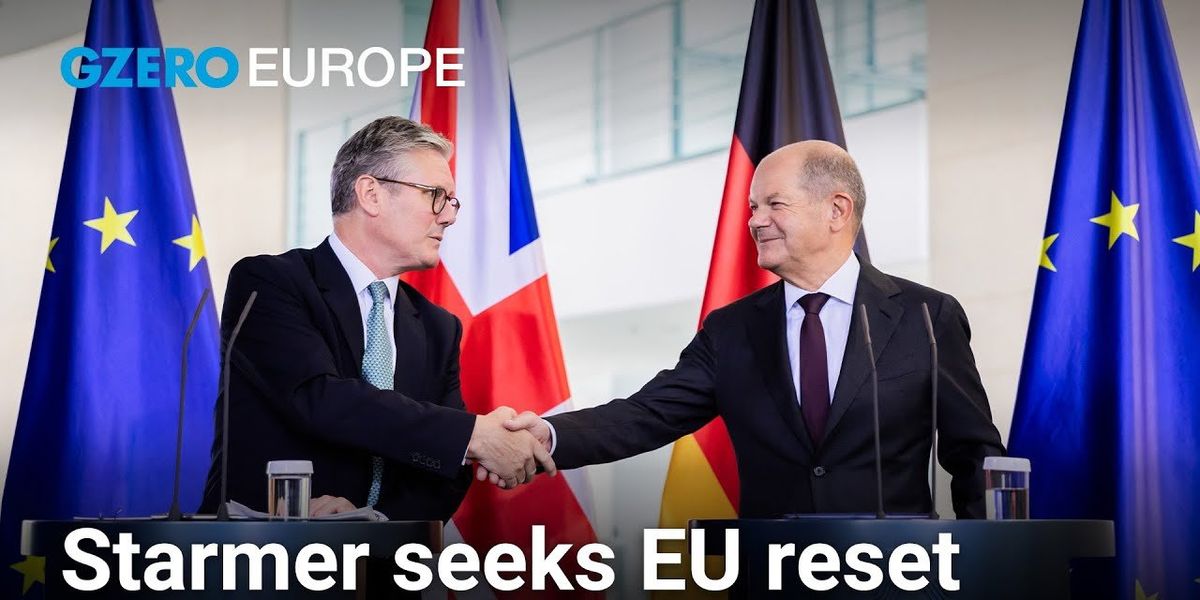Trending Now
We have updated our Privacy Policy and Terms of Use for Eurasia Group and its affiliates, including GZERO Media, to clarify the types of data we collect, how we collect it, how we use data and with whom we share data. By using our website you consent to our Terms and Conditions and Privacy Policy, including the transfer of your personal data to the United States from your country of residence, and our use of cookies described in our Cookie Policy.
{{ subpage.title }}
The body of Pope Francis in the coffin exposed in St. Peter's Basilica in Vatican City on April 24, 2025. The funeral will be celebrated on Saturday in St. Peter's Square.
World leaders to bid farewell to Pope Francis – and hold talks on the side
While the Catholic world prepares for the funeral of Pope Francis on Saturday – the service begins at 10 a.m. local time, 4 a.m. ET – certain high-profile attendees may also have other things on their mind. Several world leaders will be on hand to pay their respects to the pontiff, but they could also find themselves involved in bilateral talks.
Who’s on the list? Italian Prime Minister Giorgia Meloni will effectively be the host at the Vatican, which lies just next to Rome. Many of her fellow Western leaders will attend, including French President Emmanuel Macron, German Chancellor Olaf Scholz, Ukrainian President Volodomyr Zelensky, UK Prime Minister Keir Starmer, and US President Donald Trump. Philippine President Ferdinand Marcos Jr., who leads the most Catholic country in Asia, will also attend.
South American representation. Argentine President Javier Milei – a former adversary of Francis, his fellow countryman – and Brazilian President Luiz Inácio Lula da Silva plan to cross the Atlantic for the funeral, too.
Glaring omission. Russian President Vladimir Putin won’t attend the funeral, the Kremlin confirmed.
Side hustle. Trump appears to be the principal object of interest for other world leaders. Zelensky has already said that he’d like to speak to the US president at the Vatican, while European Commission President Ursula von der Leyen could meet the American president for the first time since he returned to office, if Meloni gets her way. They won’t have much time, though: Trump plans to spend less than 24 hours in Rome.
Spanish Vox party leader Santiago Abascal presided over the European Patriots Summit in Madrid over the weekend. The event brought together numerous conservative leaders from across Europe under the banner of "Make Europe Great Again."
From MAGA to MEGA? Europe’s far-right rallies in Madrid
Who are the Patriots and what do they want? Formed after the May 2024 European election, the bloc includes 86 members from 14 countries, representing 19 million votes. It is the third largest group in the 720-seat European Parliament, and it opposes green policies, migration, gender and family diversity, and “population replacement.” It wants to change the EU’s governance structure to one based on national sovereignty and boost Europe's economic competitiveness.
Could the Patriots make it happen? Other right-wing parties, including Italy’s Fratelli d’Italia, or FI, Poland’s Law and Justice, and the German AfD have so far refused to join. However, in a letter sent in late January, the European Conservatives and Reformists group, home to Italian Prime Minister and FI leader Giorgia Meloni, urged the center-right European People’s Party to ally with the Patriots. And as tariffs loom, Le Pen claims that the group is the only one that can “talk with the new Trump administration.”
We’ll be watching whether the AfD or other parties change their tune about joining the Patriots – and how this impacts the EU’s ability to negotiate with Trump.GZERO reveals the top 10 geopolitical game changers of 2024
2024 was a year of dramatic reversals. Some came at the ballot box, where long-ruling parties took a beating, anti-establishment figures stormed into power, or strongmen managed to see off what looked like fatal challenges. Some came on battlefields, where deadlocked conflicts began to break in one direction or another. And some came in how we think about politics and geopolitics more broadly.
This week, as we hurtle toward 2025, another year that promises to be pivotal in global affairs, we profile 10 people who, for better or worse, flipped the script, beat the odds, turned the tables, or otherwise changed the game in 2024.
GZERO's No. 10 2024 Game Changer: Italy’s Iron Lady
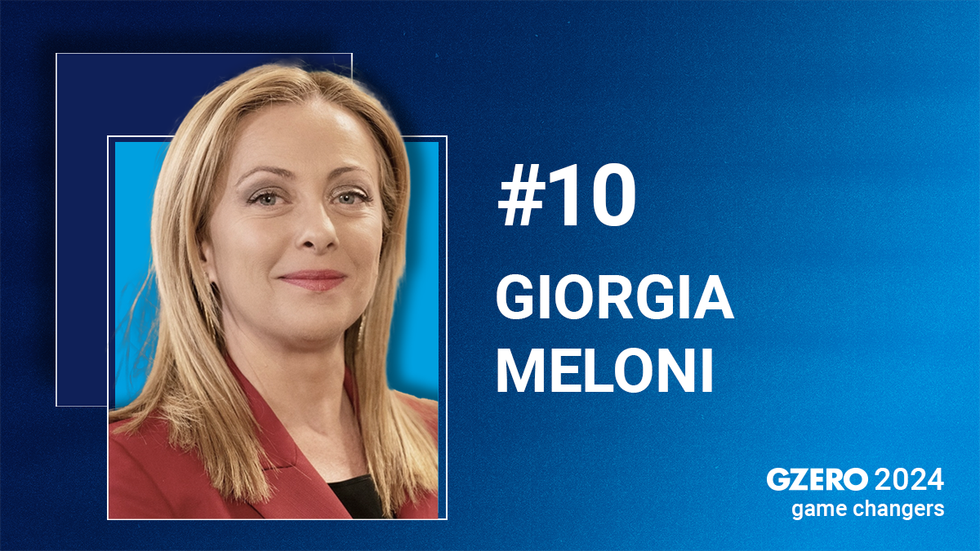
Who is she? Giorgia Meloni, 47, is Italy’s first female prime minister and the leader of the right-wing Fratelli d’Italia – Brothers of Italy – party. A staunch nationalist, Meloni rose to power in 2022, pledging to prioritize “God, family, and fatherland.” As a student, she was active in the neo-fascist Italian Social Movement before becoming Italy’s youngest-ever minister in Silvio Berlusconi’s government in 2008.
What did she accomplish in 2024? Meloni led her party to victory in Italy’s June elections, positioning herself as the “kingmaker” in the European Parliament. Her victory was due in part to her tough stance on migrants: Last year, Italy cut illegal immigration by 64%, inking agreements with Tunisia to reduce human smuggling and encouraging the EU to do the same with Egypt.
Meloni has faced pushback from Italian courts, however, on her plan to send migrants to Albanian processing centers. Her wide-ranging constitutional reforms to enhance executive power, including allowing the direct election of the prime minister, have also raised concern about potential shifts toward authoritarianism.
How has she changed the game? Meloni's migration crackdown found favor with other European leaders, including Hungarian President Viktor Orban. At the same time, she maintained strong support for Ukraine, recently authorizing Italy’s tenth military aid package for Kyiv. “Meloni has had a good year, and her fellow EU leaders in capitals and Brussels now hope she has been fully co-opted into the European mainstream,” said Mujtaba Rahman, Eurasia Group’s managing director for Europe.
What’s next for 2025? Meloni’s big domestic challenge is economic: Italy’s GDP is poised to grow by an anemic .5% in the coming year. Parliament passed several budget measures last week, including a one-off €100 Christmas bonus to 4.5 million disadvantaged families, and will continue allowing taxpayers to pre-pay their taxes for the next two years, regardless of how much they earn.
On the foreign policy front, Meloni may have an in with the incoming US administration in Elon Musk, with whom she famously traded compliments after he introduced her at the Atlantic Council’s Global Citizen Awards in October. However, Musk was subsequently seen to overstep when he criticized Italian judges who blocked deportations. And the two notably differ on future support for Ukraine. Time will tell whether Rome and Washington enjoy la bella vita – or not.
GZERO's No. 9 2024 Game Changer: Venezuela’s Strongman
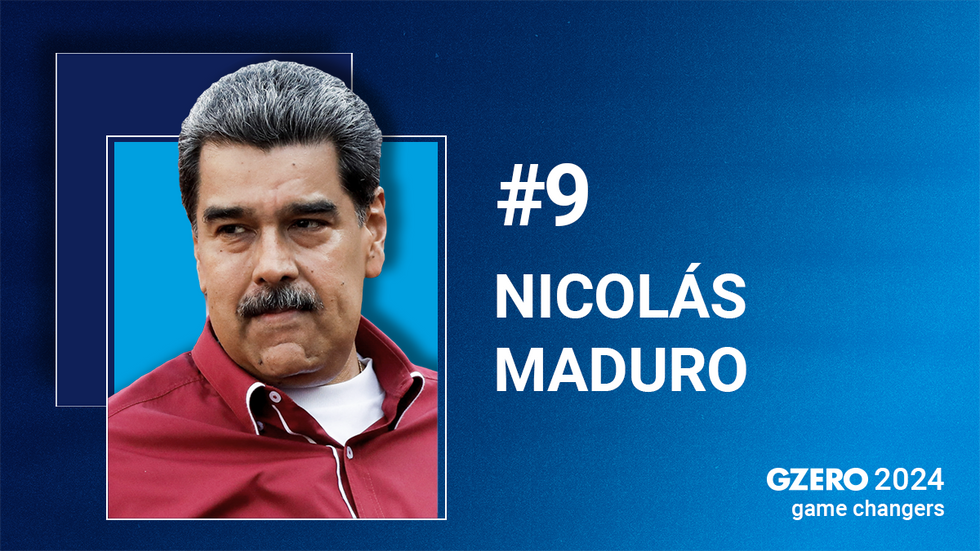
Who is he? Venezuela’s President Nicolás Maduro has been in power for 11 years, and over the past seven of those years, he has presided over one of the most spectacular social collapses in the world. Economic mismanagement, political repression, and tight US sanctions prompted more than seven million people to flee in a migrant exodus that has reverberated across the region, from South America to South Brooklyn.
What did he accomplish in 2024? Heading into the presidential election this past July, then, it seemed almost certain that the game was up for Maduro. His approval ratings were in the gutter. A historically splintered opposition had united behind a single, reasonably popular candidate. The polling was so skewed against him it seemed like he’d have to steal the election outright to stay in power.
And that’s what he did. Even as all available evidence – including thousands of voter rolls from across the country – suggested he had lost in a landslide, his government published figures showing that he had won a narrow victory. And since then, that has been that. Threats and enticements from the US have failed to budge Maduro. His police have cracked down ferociously on the opposition. He appears to be going nowhere.
How has he changed the game? Maduro has reset what looked like a losing game not only for himself but also for various outside powers that had hoped to see him gone.
What’s next for 2025? Perhaps the most interesting piece of this story will involve the US and the incoming Trump administration.
Trump has pledged to deport millions of undocumented migrants, and many of them are Venezuelan. Where will they go? Repatriation to their home country will require an agreement of some kind with Maduro.
Trump’s Secretary of State nominee, Sen. Marco Rubio, is a Cuban-American who is ultra-hawkish on the communist regime in Cuba as well as its “21st-century socialist” backers in Caracas. If Rubio had his druthers, both governments would be out of power, but he will now need to deal tactfully with Maduro, who has shown that he is, for better or worse, to be reckoned with rather than written off.
“While Trump’s team has hinted at space for a negotiation related to migrants,” says Eurasia Group's Latin America Director Risa Grais-Targow, “the president-elect’s specific history with Maduro, loyalty to Florida voters, and preference for US oil and gas production will limit the scope for a grand bargain and further sanctions relief.”
GZERO’s No. 8 2024 Game Changer: South Africa’s divisive populist
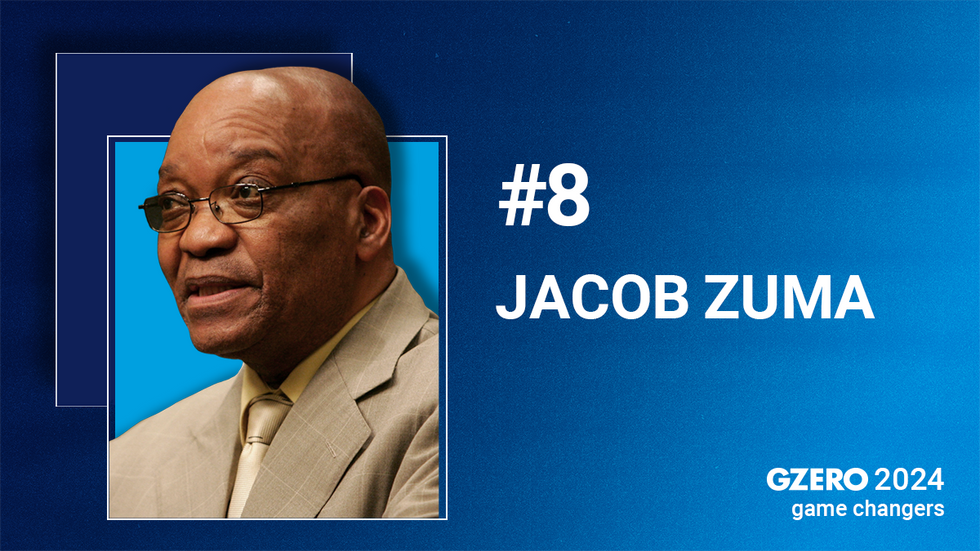
Who is he? It’s not often a former president continues to play a crucial role in the longer-term direction of his country’s politics, but Jacob Zuma is no ordinary former president. From 2009-2018, the charismatic Zuma led the African National Congress and served as South Africa’s president. A series of corruption allegations forced him from power, and Zuma felt he’d been betrayed by his deputy, Cyril Ramaphosa, who is now the ANC’s leader and South Africa’s president.
What did he accomplish in 2024? In 2024, three years after he served two months in prison on a corruption-related charge, Zuma came for his revenge. He formed a brand new political party — uMkhonto we Sizwe, or MK — and ran again for president. The new party didn’t come close to winning nationally, but by drawing 45% support in Zuma’s home region, KwaZulu-Natal, he helped strip the ANC of its national majority.
How has he changed the game? The ANC, Nelson Mandela’s party, the political embodiment of liberation from apartheid, saw its national vote share fall from 57% in 2019 to just 40% in 2024. That stunning result then forced the ANC to invite the largest opposition party, the Democratic Alliance, to form a government of national unity. This is the first time the ANC has had to share national political power since the end of apartheid more than three decades ago.
Zuma’s ambitions were not the only factor that pushed down the ANC’s vote share so sharply. South Africa is still plagued with high unemployment, inflation, corruption, crumbling infrastructure, and a lack of economic opportunity for young people. But, according to Eurasia Group Africa expert Ziyanda Stuurman, “there is a direct line between Zuma’s political maneuvers [in 2024], and the emergence of a coalition government few people would have ever thought was possible.”
What’s next for 2025? It’s too early to say whether forcing the ANC to work with the opposition DA will prove positive or negative for South African politics, but it’s clear that Jacob Zuma changed the political game this year in his country. His challenges to Ramaphosa’s government will continue into 2025.GZERO’s No. 7 2024 Game Changer: Citizens who said ‘No’ to status quo
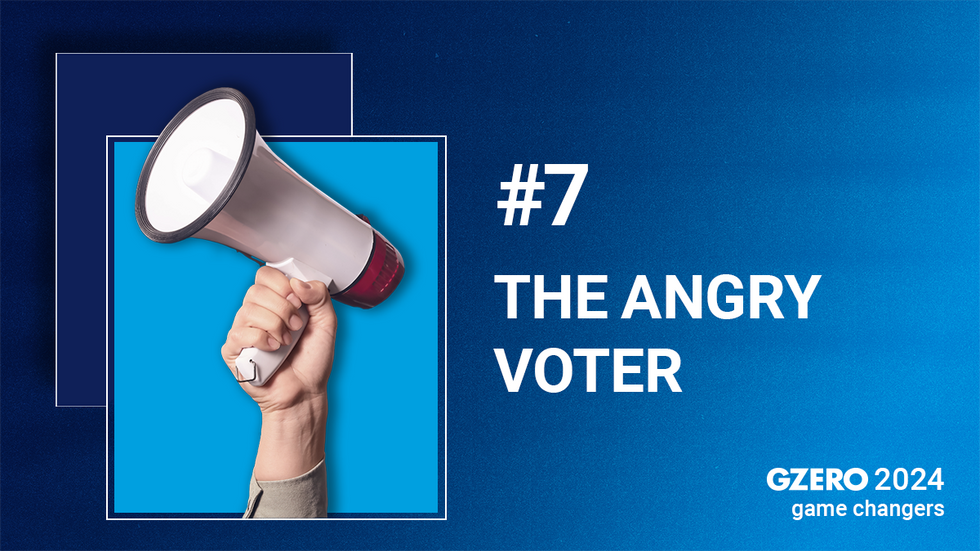
Who are they? Voters went to the polls this year in more than 50 countries with a combined population of more than 3.5 billion. A lot of them had strong messages to send their elected leaders.
What did they accomplish in 2024? In June, voters in India stunned outside observers by stripping the still-popular Prime Minister Narendra Modi’s Bharatiya Janata Party of its majority in parliament. The result forced the BJP to turn to fickle allies to pass more of Modi’s reform agenda and limited his room for maneuver.
Also in June, voters in South Africa made history by depriving the African National Congress of its majority for the first time in the country’s post-apartheid history. With just 40% of the vote, the ANC was forced to invite the opposition Democratic Alliance to form a unity government — one that has held together contrary to expectations, it must be said.
In July, voters in France punished their centrist President Emmanuel Macron by casting ballots for enough far-left and far-right parties to gut the political center. After struggling to form a government to advance state spending reforms, left- and right-wing parties came together to force Michel Barnier, a compromise choice for PM, out of his job. France’s political crisis continues.
Also in July, fed-up voters in the UK ended 14 years of rule by the Conservative Party in favor of Labour, led by new Prime Minister Sir Keir Starmer. The Conservatives' share of parliamentary seats fell from 252 to just 121, in part because Nigel Farage’s new Reform UK party drew much of the Tories’ support. And British politics has only become more combative. A November poll found that the percentage of UK adults with an unfavorable view of Starmer’s work as PM outnumbers those who approve by well over two to one.
In October, a shock election result in Japan cost the Liberal Democratic Party its majority in the Diet, the country’s legislature. The LDP has held power almost continuously for nearly 70 years.
In November, Donald Trump carried all the so-called swing states in a victory that will replace President Joe Biden and Vice President Kamala Harris with a Republican Party administration.
“Unemployment hurts a small number of people a lot, but inflation irritates everyone,” notes Eurasia Group’s Vice Chairman Gerald Butts. “Incumbents are discovering that hurting all of the people even some of the time makes the whole country angry at their government.”
GZERO’s No. 6 2024 Game Changer: Russia’s ruthless leader
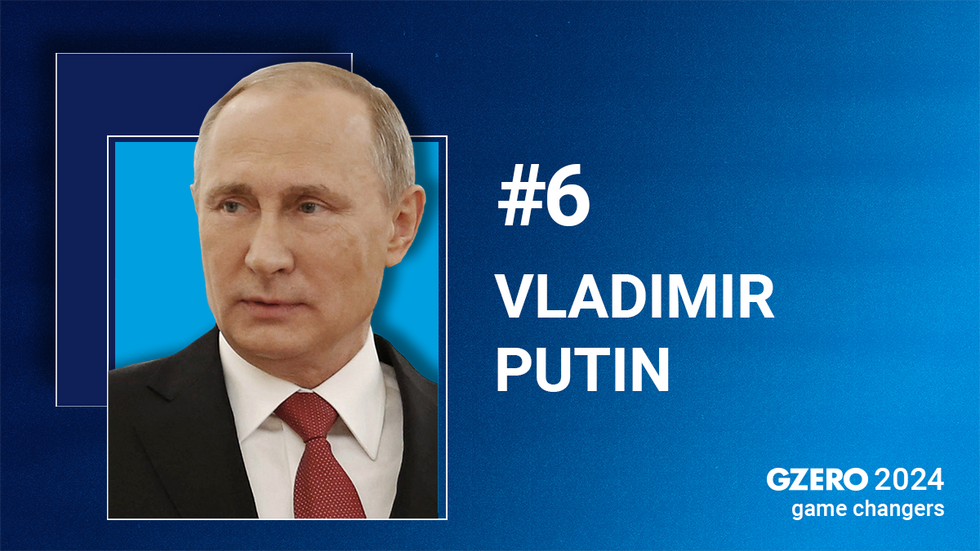
Who is he? Vladimir Putin, the ex-KGB agent who has ruled Russia without interruption since the turn of the millennium, hardly needs an introduction – you know the name. But even after nearly a quarter century in power, he continues to flip scripts year in and year out, and 2024 was no different.
What did he accomplish in 2024? As recently as a year ago, Ukraine and its Western backers still held out hope that Kyiv’s forces might push back the Russian invaders who have laid waste to so much of the country since the 2022 invasion. Since then, Putin has – slowly, cynically, but successfully – shown otherwise.
Today, Russian forces are grinding their way westward in the Donbas while Ukraine suffers shortages of manpower. Kyiv’s bid to divert Russian attention from Eastern Ukraine by invading a small corner of Russia itself in August hasn’t worked out – Putin didn’t take the bait, instead calling in North Korean troops to help repel the Ukrainian incursion.
Meanwhile, US President-elect Donald Trump has questioned support for Ukraine and pledged to end the war “in 24 hours.”
How has he changed the game? By altering perceptions of what’s possible. “In 2025, Ukrainian society will be reassessing their all-or-nothing view of victory,” says Tim Mak, editor of “The Counteroffensive” in Kyiv. “As a democratic country, Ukrainians are increasingly expressing a willingness to negotiate -- and a fear that continuing the war could lead to frontline disaster due to manpower shortages.”
What’s next for 2025? Not everything is roses for Putin these days. His heavily sanctioned economy grows only because of massive military spending. Inflation is high. The population continues to shrink, as birth rates are low and hundreds of thousands of talented young people have left in opposition to the war. Russian casualties in Ukraine now dwarf those of the late Soviet Union in Afghanistan. Globally, Moscow is increasingly the junior partner to a rising China, and the Kremlin just lost Syria, its most important ally in the Middle East.
But heading into 2025, Putin has set himself up to negotiate over Ukraine, and potentially over other issues, from a position of greater strength than many had believed, or hoped, just a year ago.
Honorable Mention: Kim Jong Un
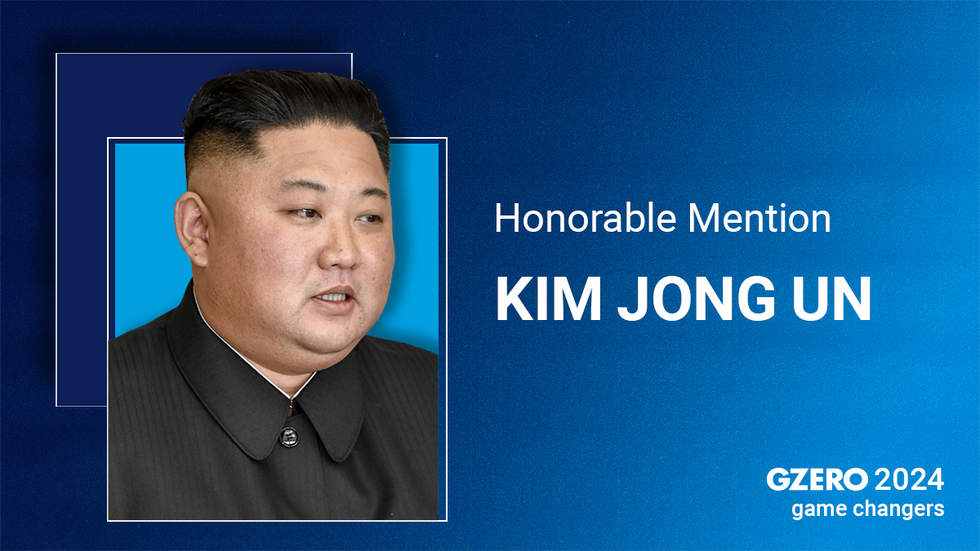
Who is he? Kim Jong Un, the 40-year-old Supreme Leader of North Korea, has been at the helm of the Hermit Kingdom since his father, Kim Jong Il, died in 2011. Following a ruthless consolidation of power, he has directed his energy and the state’s meager finances toward expanding the country’s nuclear weapons program, which he sees as central to North Korean security and sovereignty.
What did he accomplish in 2024? He concluded a mutual defense treaty with Russia while hosting President Vladimir Putin in Pyongyang in June — the first visit to the city by a Russian leader in a quarter century — that laid the groundwork for his deployment of troops to fight in Ukrainian-occupied areas of Russia. The deployment is a major escalation compared to the weapons aid he has been supplying Moscow since 2023, though thus far he has acted with total impunity. That treaty also opened much deeper cooperation with Russia to advance North Korea’s military technology, including progress on nuclear-powered submarines and a more powerful ballistic missile as well as attempts to launch spy satellites.
Kim radically overhauled his government's policy toward South Korea. In January, he renounced the goal of reunification with the South, officially removing it from the constitution. He also rather theatrically destroyed road and rail links to the south, constructed during a period of rapprochement at the turn of the 21st century.
How has he changed the game? By changing the terms on which it’s played. “The dramatic deepening of North Korea-Russia diplomatic and security ties in 2024,” says Eurasia Group expert Jeremy Chan, “has given Pyongyang more strategic optionality and greater assurance that neither South Korea nor the US will attempt an invasion.”
Seoul and Washington can’t credibly threaten military action without running unacceptable risks, and Kim’s control over domestic affairs still appears iron-clad. What’s more, by deepening relations with Moscow, Kim puts pressure on his frenemies in Beijing, who have few tools at their disposal in the relationship besides accommodation.
What’s next for 2025? If Kim has his druthers, talks with Donald Trump to secure recognition of his nuclear status. “These various nuclear and defense-related capabilities attained in 2024 will provide Kim with leverage in future negotiations with Trump,” says Chan, “while allowing Pyongyang to retain its hard-won nuclear deterrent, something which Kim has vowed will never be bargained away.”
Couple that with political chaos in the South after Yoon Suk Yeol’s attempted coup in early December, and it’s looking like the peninsula is in for a wild ride next year.
GZERO’s No. 5 2024 Game Changer: The Syrian rebel who reshaped the region
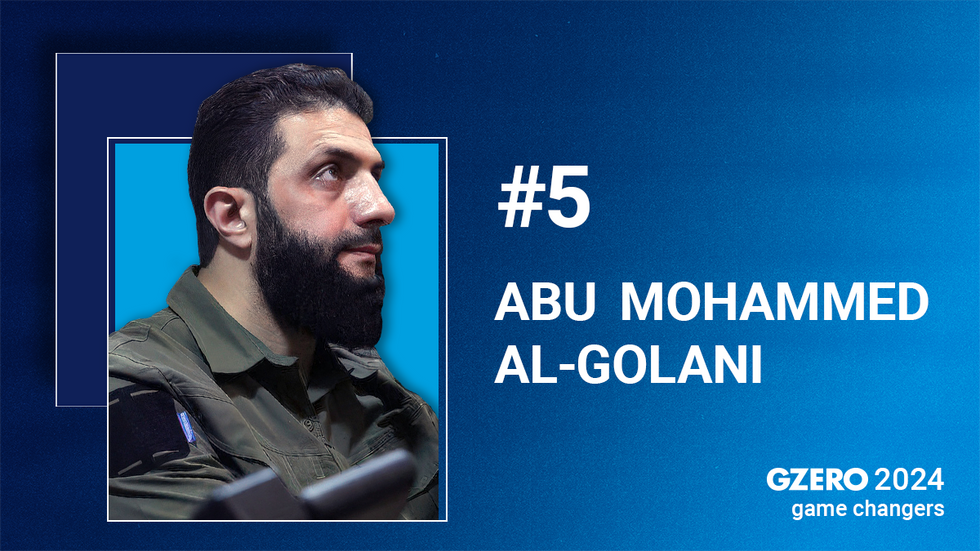
Who is he? The 42-year-old leader of the Syrian jihadist group Hayat Tahrir al-Sham, or HTS, al-Golani, born Ahmed Hussein Al-Shara, grew up in a middle-class Syrian family. He went to Iraq in 2003 to fight with al-Qaida against the US occupation, taking his nom de guerre “al-Golani” to honor relatives displaced from the Golan Heights, an area of Syria that Israel has occupied since 1967.
After the Syrian civil war began in 2011, al-Golani founded the anti-Assad jihadist Nusra Front group, which later rebranded as HTS.
In recent years, as he established control over northwestern Syria, al-Golani has sought to distance himself from global jihad and present himself as a statesman interested in stabilizing Syria.
What did he accomplish in 2024? In early December, HTS led a military campaign that surged across the country, capturing key cities within days. When the Syrian regime’s longtime backers in Russia and Iran failed to send more support to Bashar Assad, the game was up. In little more than a week, al-Golani’s forces had toppled the 54-year-old House of Assad.
How has he changed the game? The collapse of the famously despotic Assad regime has sent shockwaves through the region. Syria, for decades a bulwark of expanding regional power for Shia Iran, as well as Russia, is now under the nominal control of HTS, a Sunni group with links to Turkey, a country politically at odds with most major Arab powers. Israel is watching warily and has already struck at Syrian arms depots to prevent them from falling into the hands of anti-Zionist groups. Donald Trump wants the US to “stay out of it,” but he’ll inherit the nearly 1,000 US troops in Syria fighting Islamic State remnants. Iran and Russia, for their part, can hardly be expected to simply fade away.
What’s next for 2025? Al-Golani’s rule is barely a week old. He must establish order in a fractious country wrecked by more than a decade of brutal civil war. Can he? And will his vision of Syria allow the country’s sectarian minorities to live in peace and dignity? Is there a world where the 7 million Syrian refugees who have gone to Turkey and Europe since 2011 really choose to return?
In some ways, “the collapse of the Assad regime is the Middle East’s most hopeful moment in over a decade,” says Firas Maksad, a senior fellow at the Middle East Institute in Washington, DC. “But it carries within it the seeds of further communal and regional conflicts that could persist for a decade to come.”
What we know for sure is that al-Golani’s forces have already smashed decades-old assumptions about the balance of geopolitical, regional, and sectarian power in a volatile region. Whatever comes next begins now.
GZERO’s No. 4 2024 Game Changer: Israel’s political survivor

Who is he? Israel’s longest-serving prime minister, Benjamin Netanyahu leads the right-wing Likud Party. He was the first Israeli prime minister elected by direct popular vote in 1996 and served until 1999. He regained the premiership from 2009 to 2021, and then again in November 2022. His latest administration has been marked by the Oct. 7, 2023 attack by Hamas, mistreatment of Palestinian groups, limiting the Supreme Court’s power, and his own legal challenges, including charges of bribery and fraud.
What did he accomplish in 2024? Netanyahu has, as he promised in the wake of Oct. 7, reshaped the balance of power in the Middle East.
He has greatly weakened Israel’s adversaries, Hezbollah and Hamas, eliminating Hamas leader Yahya Sinwar and Hezbollah chief Hassan Nasrallah. Israel used the fall of Syria’s Assad regime as an opportunity to take control of areas in Syria beyond the Golan Heights and take out its neighbor’s military capabilities. Meanwhile, doubts about Israel’s deterrence abilities following Oct. 7 have been restored after it largely shot down all of Iran’s retaliatory missile strikes.
Eurasia Group’s Senior Analyst Greg Brew says Netanyahu’s greatest triumph was overseeing the war against Hezbollah, which decimated the group’s leadership, killed thousands of its fighters, and degraded its capacity to strike Israeli cities, without triggering serious retaliation.
How did he change the game? Netanyahu began 2024 with 85% of Israelis calling for his removal and officials circulating petitions calling him an “existential threat” to the country over his handling of the Gaza War. He is accused of abandoning the Oct. 7 hostages and prolonging the war for his own benefit.
"Netanyahu began 2024 still dealing with the aftershocks of October 7 - military, political and social - and a full-fledged offensive in Gaza," says Tel Aviv based journalist and advisor at Israel Policy Forum Neri Zilber. "The ensuing year saw him slowly grind down his opponents both domestic and foreign, following one overarching objective: playing for time and remaining in power. And it worked probably better than he could have ever expected."
He ignored US demands to treat Gazans humanely, calling Washington’s bluff over withholding military aid if Israel did not increase the flow of food and humanitarian aid. However, doing so has further alienated Israel on the global stage, leading global institutions, leaders, and human rights groups to accuse Netanyahu of committing genocide in Gaza.
Nevertheless, he is ending the year with a 47% approval rating, seeing his popularity rebound after his aggressive campaign against Hezbollah and Iran. “Netanyahu is looking much stronger than he was six months ago,” says Brew. “The war against Hezbollah, the strikes on Iran, and the decimation of Hamas has strengthened his claim to be the strongest figure ensuring Israel’s security.”
While centrist figures like Yoav Gallant and Benny Gantz have departed his cabinet, forcing Netanyahu to rely more heavily on far-right figures, “he has kept his coalition together and looks likely to do so in 2025,” explains Brew.
What to expect from him in 2025? The coming year will open up various possibilities for Netanyahu. "He has the option of simply holding on to power and continuing the grinding low-level war in Gaza; he can opt to cut a deal for the hostages in Gaza, even at the cost of halting the war, and use it as leverage for a larger peace deal with Saudi Arabia," predicts Zilber.
In the year ahead, Netanyahu is likely to benefit from and be emboldened by the Trump administration. Donald Trump shares Israel’s hatred of Iran, supports the Gaza War ending on Israel's terms, and has appointed Mike Huckabee, who is vocally in support of Israeli settlements in the West Bank, as the ambassador to Israel. Netanyahu's dependence on far-right figures like Itamar Ben-Gvir and Bezalel Smotrich will constrain his options when it comes to normalizing relations with Arab states like Saudi Arabia — something Brew says is certain to be a US priority under Trump.
But with US support all but guaranteed and public sentiment back behind him, Netanyahu is likely to continue his aggressive maneuvers in the Middle East into 2025.
“Netanyahu’s foreign policy priority in 2025 will be addressing the threat posed by Iran, and specifically Iran's nuclear programs,” says Brew. “I expect this to be the focal point in his relationship with Trump, along with issues of importance to his coalition, such as confirming US support for the settlement of territory — and perhaps even the partial annexation — of the West Bank.”
GZERO’s No. 3 2024 Game Changer: Those responsible for global migration
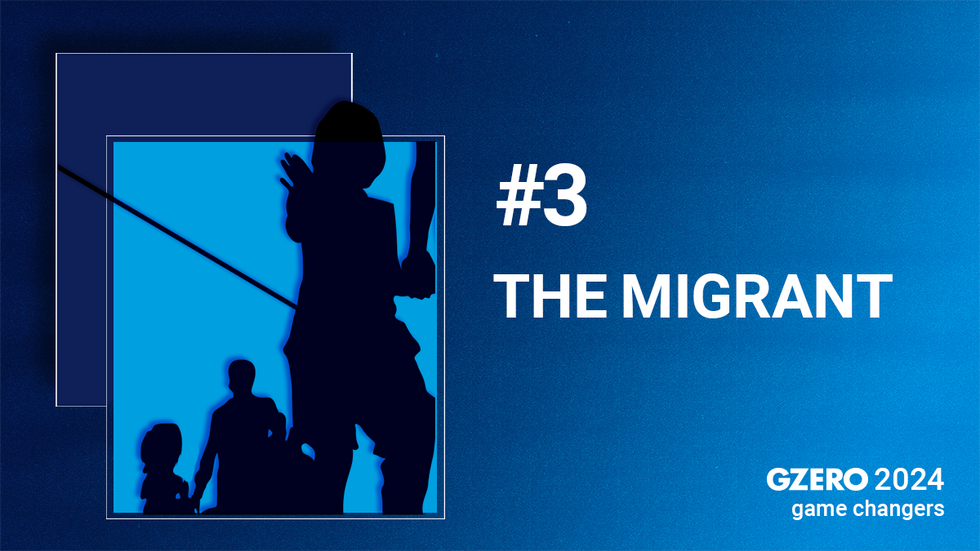
Who are they? The migrant took many forms in 2024, driven by armed conflicts, economic downturns, and the promise of opportunity – but their numbers fell as countries clamped down and closed borders. Irregular crossings of Middle Eastern and African migrants to Europe dropped by 42% in the first nine months of the year. Latin American migrants pursued better economic prospects in the US, but their numbers also declined sharply. Asian and South Asian emigres moved to Australia and Canada for education and jobs, but those countries also cut numbers back. In Africa, South Africa implemented a points system to prioritize skilled workers, while intra-continental migration surged in the North due to unrest in Sudan.
What did the migrant accomplish in 2024? Economically, migrants played a crucial role in labor markets, filling gaps in sectors like agriculture, healthcare, and technology. In some countries, their economic impact helped stave off a recession. But some migrant groups exacerbated social tensions, notably around issues that engaged their diasporas, such as the Israel-Hamas War, and also put a strain on cash-strapped public services.
And the latter issue caused a backlash among voters. “Since the pandemic, there has been a major increase in the number of immigrants, primarily legal ones, to Canada, the US, Europe, and the UK to address labor shortages,” said Graeme Thompson, senior analyst at Eurasia Group. “The problem is that first, those numbers increased very rapidly to historically unprecedented levels, and second, that has been combined with preexisting stresses on housing and social services. And that combination has proved politically explosive."
How did the migrant change the game? This past year, the migrant shaped elections around the world. Illegal immigration was the pivotal issue in the US presidential election, as now-President-elect Donald Trump accused the Democrats of failing to control America’s borders and blamed illegals for a surge in crime. In Europe, Austria's general election campaign was dominated by migration issues, with the far-right Freedom Party advocating for stringent asylum policies, while in Germany and Italy, anti-immigration parties saw a surge in support. Immigration was a key election issue in South Africa, where the ANC lost its majority as opposition parties pushed anti-migrant policies.
What to expect in 2025? The migrant will remain a source of tension as countries continue to clamp down on illegal immigration. Trump’s deportation plans could provoke a surge of migrants to Canada, prompting the Canadian government to announce a billion dollars in spending to harden its southern border. European countries, meanwhile, have stopped processing the claims of Syrian refugees in the wake of Bashar Assad’s overthrow, and many refugees plan to return home. But it remains to be seen whether the new regime will provoke a new exodus as minority groups such as the Kurds may feel under threat. The impact of immigration on housing has become a central issue in Canada and Australia, both set to have elections in 2025. And in Africa, the ongoing war in Sudan has displaced 11 million people and doesn’t look to end any time soon.
GZERO’s No. 2 2024 Game Changer: Billionaire entrepreneur
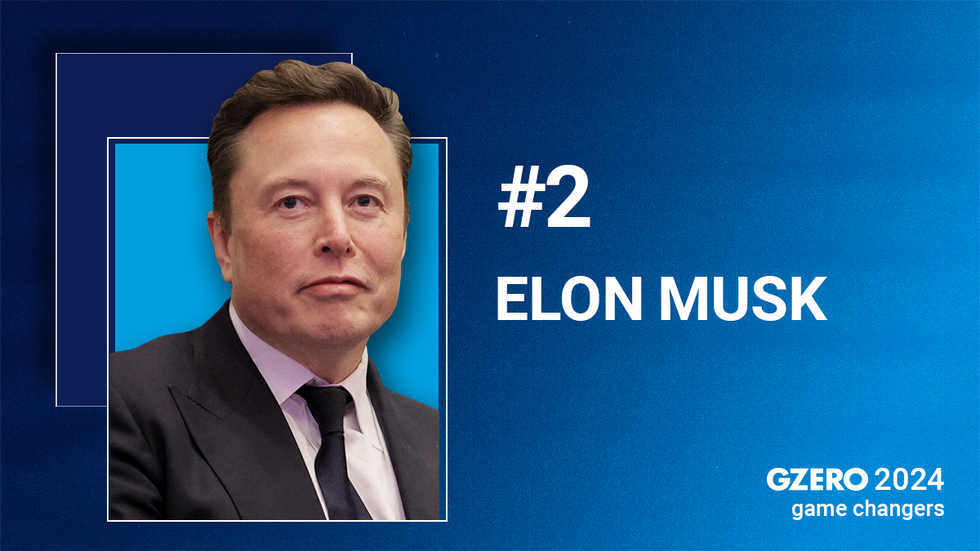
Who is he? The CEO of X, Tesla, and SpaceX, Elon Musk is the wealthiest and possibly the most powerful private citizen in the world. He controls a revolutionary space company, America’s top electric vehicle producer, and a big chunk of the global public square formerly known as Twitter. In 2025, he’s set to be the beneficiary of the biggest political bet of 2024: spending over $100 million in donations and leveraging his 200-plus million followers on X to support a Trump win for the American presidency.
What did he accomplish in 2024? In 2024, Musk became a political kingmaker. Musk’s financial and technological backing of the Trump campaign, including his use of AI-driven voter engagement tools, upended traditional election strategies. After Trump’s victory, Musk was appointed Director of Government Efficiency, or DOGE, a newly created position that will leverage private sector innovation to streamline federal operations. He even earned the praise of arch-lefty Sen. Bernie Sanders, who said “Elon Musk is right” to want to curb wasteful Pentagon spending.
How has he changed the game? Musk’s influence on politics and governance is unprecedented. By combining his tech empire with his growing political clout, Musk has blurred the lines between private enterprise and public policy. Musk has turned up on phone calls and meetings with global leaders (Ukraine’s Volodymyr Zelensky, Hungary’s Viktor Orban) and, closer to home, technology rivals (Google CEO Sundar Pichai).
What’s next for 2025? With DOGE, Musk plans to unveil a federal efficiency initiative targeting defense spending and bureaucratic red tape. While he’s not taking a salary, new programs could significantly benefit SpaceX, particularly in the area of military logistics and battlefield AI, raising questions of a conflict of interest. And Starlink’s satellites could replace Washington’s existing plans for hard-wired broadband infrastructure.
What does this mean for other companies seeking to do business with Washington – and for politicos seeking influence? “Getting on Elon’s good side has never been more important,” observes Eurasia Group President Ian Bremmer. “And for all the whispering in Trump circles that the White House won’t be big enough for their two personalities and wills, both men deserve credit for being extremely careful in managing relationships where their livelihood is at stake.”
GZERO’s No. 1 2024 Game Changer: MAGA in chief
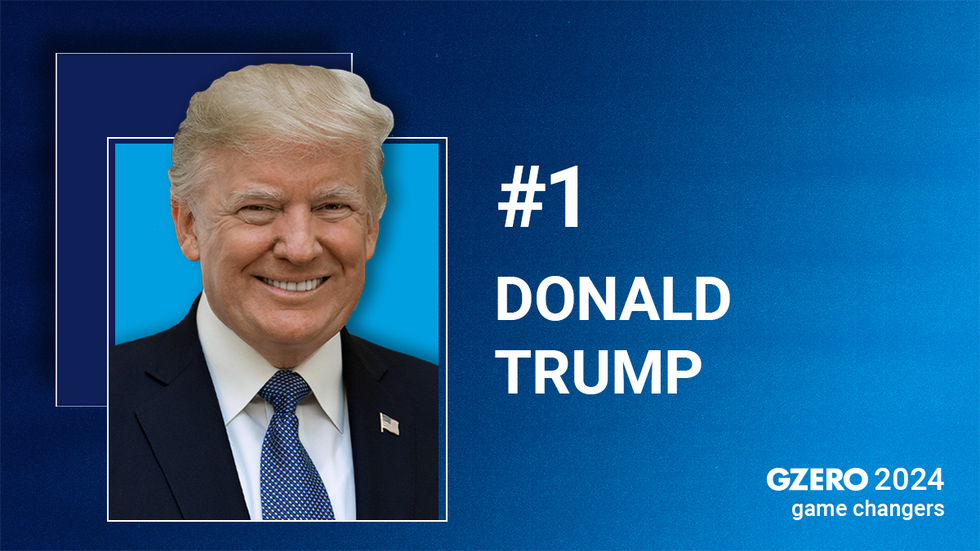
Who is he? At this point, Donald Trump – GZERO’s top political game changer of the year – needs no introduction. The New York native and real estate mogul began his political career in 2015, cementing it a year later by beating Hillary Clinton to win the presidency. But he was defeated by Joe Biden in 2020 in large part because of how he handled the COVID-19 pandemic, his harsh immigration policies, and his pattern of erratic behavior.
What did he accomplish in 2024? The former president turned president-elect is set to return to the White House after winning the electoral college and the popular vote in what was meant to be a close election. Trump is backed by a Republican-controlled Congress, a conservative majority on the Supreme Court, and a cabinet of loyalists determined to implement his policy agenda.
“Trump won the closest thing you can these days that counts as a mandate, and he’s the first Republican to win the popular vote since 2004,” says Eurasia Group’s US expert Noah Daponte-Smith. “That’s a big accomplishment, and it matters to the way he’s going to govern.”
How did he change the game? Trump’s win was no inevitability. Flash back to the Republican primaries, when he faced competition from Florida Gov. Ron DeSantis and former South Carolina Gov. Nikki Haley – until, that is, voters showed that the base remained squarely in Trump’s camp.
He prevailed despite facing 34 soon-to-be-obsolete felony convictions, the fallout from the Jan. 6 insurrection, and two states attempting to kick him off their primary ballots. In fact, in many ways, Trump used those setbacks to his advantage, spinning them to rally voters to the polls.
Trump won every swing state, accumulating the most electoral college votes for a Republican since 1988. He widened the party’s base, winning 2.5 million more votes than when he ran as the incumbent in 2020.
In doing so, he revealed the country had swung to the right, turned out a record number of young male voters, and made inroads with some Democrats – increasing his support among every demographic group besides women. He survived an assassination attempt against him and used it to further rally his party around him. The GOP is now Trump’s party, and any remaining old-school Republicans who may have opposed him have been left party-less – some even crossed the aisle to endorse Kamala Harris.
An underrated contributor to Trump’s victory was his “mastery of the new information ecosystem,” notes Daponte-Smith. “Trump’s podcast blitz in the middle of the campaign baffled many at the time but in retrospect looks to have been a deft move that enabled him to make substantial inroads among demographics that traditionally don’t lean Republican.”
What to expect from him in 2025. Even before his inauguration on Jan. 20, Trump is meeting with world leaders, compiling a cabinet of loyalists, and vowing to implement punishing tariffs on America’s allies and enemies.
In conflicts in Ukraine and the Middle East, Trump is likely to push for temporary ceasefires to demonstrate his peacemaking abilities, which may ultimately result in the partitioning of Ukraine and expanded Israeli power over Palestine. Meanwhile, he will likely restart his “maximum pressure” campaign to heavily sanction Iran.
Daponte-Smith says he is expecting Trump to make headway in three key areas: trade, taxes, and immigration. He will likely substantially raise tariffs on China in the first year while limiting illegal immigration to the US and ramping up deportations. “The tax bill at the end of the year, which will very likely extend all of the 2017 tax cuts, will be the cherry on top for Republicans, who know that trifectas tend to be short-lived and are looking to move quickly to make the most of this one.”
- 2023 game changers that weren’t ›
- Top 10 game changers of 2023 ›
- What Assad’s fall means for Syria, the Middle East, Moscow and Washington ›
- G7 meeting: Ukraine and Meloni take center stage ›
- Netanyahu's uncompromising UNGA address ›
- How will Trump 2.0 approach foreign policy? ›
- Elon Musk and the Political Power of Young Men ›
Displaced Palestinians walk in a tent camp amid the conflict between Israel and Hamas in Khan Younis, southern Gaza Strip, on Nov. 9, 2024.
Hard Numbers: Israel expands humanitarian zone, Bitcoin bounces, Italy’s Meloni loses in court, OECD prices remain high, A very late book return
84,653: The price of bitcoin hit a record high of $84,653 on Monday afternoon on hopes that President-elect Donald Trump will offer cryptocurrency-friendly policies. A year ago, bitcoin sold for about $37,000.
7: An immigration court in Italy has rejected Prime Minister Giorgia Meloni’s bid to detain Europe-bound asylum-seekers in Albania. The judge ruled that seven Bangladeshi and Egyptian men brought to Albania by an Italian warship must be taken to Italy and remain there as they await a decision on their asylum application.
30: Though the inflation rate has cooled across wealthy countries, average price levels across the OECD remained about 30% higher in September 2024 than in December 2019, before COVID and Russia’s invasion of Ukraine sent inflation surging.
51: A book called “The Early Work of Aubrey Beardsley” was returned to a public library in Massachusetts last week. The book was due for return on May 22, 1973, making it 51 years late. President-elect Donald Trump has vowed that China’s government will pay the fine. (Just kidding.) The Worcester Public Library does not charge late fees.Starmer pursues EU alliances to soften Brexit blow
Carl Bildt, former prime minister of Sweden and co-chair of the European Council on Foreign Relations, shares his perspective on European politics from Tabiano Castello in Italy.
What is motivating the Starmer UK government from seeking new security treaties with Germany and with Paris?
Well, it has to do essentially with Brexit, trying to mitigate the consequences of that and reengaging with European countries. That has tended to focus more on security issues. We'll see what's going to be the content of it. But in economic terms, as long as one excludes what the UK government does, going back into the single market and going back into Customs Union, to mitigate the economic consequences, a damaging one of Brexit, has got to be very difficult. It's a small step, but a good one.
What is the effect of Italy's very restrictive policies on migration and what's happening in the Mediterranean on the migration flows across the Mediterranean?
Yep, it's true. The Meloni government is taking a very restrictive approach, confiscating or impounding humanitarian relief boats, which is very controversial and heavily criticized. But the effect has, of course, been a significant drop in the number of people arriving. While last year, at this particular time, up until this time, it was 112,000 people arrived on the shores of Italy. Now that figure is down to 40,000. But several thousands have disappeared into the Mediterranean.
FILE PHOTO: French President Emmanuel Macron walks next to Italy's Prime Minister Giorgia Meloni on the first day of the G7 summit, at the Borgo Egnazia resort, in Savelletri, Italy June 13, 2024.
Macron-Meloni spat spotlights Europe’s left-right divide
They’re calling it the death stare: In a clip that went viral, Italian Prime Minister Giorgia Meloni was caught glaring at French President Emmanuel Macron at the G7 summit late last week.
The two leaders clashed after Italy demanded the removal of a specific reference to “safe and legal abortion” from the final G7 statement. When Macron told reporters he regretted the change, Meloni shot back, saying he was out of touch with his voters and accusing him of campaigning at the summit.
Both later downplayed the incident, but the “death stare” moment spotlighted an ideological divide that is central to the French election. The progressive Macron is fighting for his political life against the right-wing National Rally party of Marine Le Pen and her protege, Jordan Bardella. A left-wing coalition has now formed — including a surprise comeback for former President François Hollande — to prevent the right from taking power, but the polls still have RN in the lead.
In an attempt to woo moderates and the financial sector, Le Pen now says she would work with Macron as president, a process known as “cohabitation,” in which each would control certain sectors of policy. We’ll know on June 30 whether voters – and investors – will be swayed.Ukrainian President Volodymyr Zelenskiy speaks with Italy's Prime Minister Giorgia Meloni, on the first day of the G7 summit at the Borgo Egnazia resort, in Savelletri, Italy, June 13, 2024.
G7 meeting: Ukraine and Meloni take center stage
Leaders from the G7 countries met Thursday in Italy’s Puglia region, where the future of Ukraine aid was high on the agenda
Who’s there? The meetings are hosted by Italian Prime Minister Giorgia Meloni, who is at the height of her political power after European Parliamentary elections last weekend. She stands in contrast to other G7 leaders from Canada, the US, the UK, Japan, and Germany, all of whom are on shakier ground domestically.
Meloni also invited an A-list of non-Western leaders like President Volodymyr Zelensky, Prime Minister Narendra Modi, and Brazil’s President Luiz Inácio Lula da Silva.
The highlights: Biden and Zelensky affirmed their partnership at a bilateral press conference. The group agreed to loan Ukraine $50 billion to rebuild its devastated infrastructure with the understanding it would be paid back by interest earned on the frozen Russian assets. They also passed a new round of sanctions aimed at countering China’s effort to remake Russia’s defense industrial base.
Looming over the group’s progress on Ukraine was the possibility that Donald Trump, who has spoken openly of pulling out of NATO and against further Ukraine aid, could be back in power by the time the group next meets in 2025. Several present — including Prime Minister Rishi Sunak and President Emmanuel Macron — are facing elections that could redefine Europe.
Italian Prime Minister Giorgia Meloni welcomes European Commission President Ursula von der Leyen at Chigi Palace, in Rome, Italy, January 9, 2023.
Unlikely allies: Von der Leyen and Meloni's potential partnership
As the dust settles from last weekend’s EU Parliament elections, Italian Prime Minister Giorgia Meloni is holding all the cards, and EU Commission President Ursula von der Leyen is preparing to kiss the ring.
The EU undeniably shifted right in the election, with support for Meloni’s right-wing coalition climbing to more than 47%. Meanwhile, for von der Leyen, the center held — but barely. Her coalition of mainstream parties won a narrow 400-seat majority, but with many threatening to defect, so she will need to pull votes from Meloni’s camp to secure the 361 votes she needs to win a second term as commission president on July 18. For Meloni, supporting von der Leyen could further cement her influence in Brussels.
These women aren’t diametrically opposed. While Meloni's party traces its roots back to a neo-fascist group, and her 2022 victory set the tone for far-right gains across Europe, she’s moderated her position on the international stage and dropped her previous anti-EU rhetoric. She is also a fervent Ukraine supporter, which could make her a key bridge to the far right for von der Leyen, who announced on Tuesday that the EU will send €1.4 billion to Ukraine and that it will begin accession talks this summer.
Meloni is gearing up to host the G7 meeting on Thursday, and Ukraine will top the agenda. We will be watching to see whether she and von der Leyen team up on securing more aid, which could signal a deepening partnership in parliament to come.
